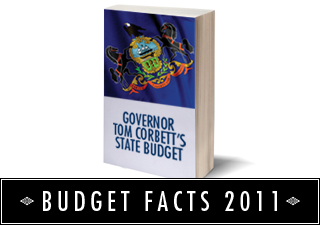Fact Sheet

School Taxpayer Referendum & Property Tax Relief
Gov. Tom Corbett’s FY 2011-12 budget proposal includes $63.6 billion in total operating spending—$27.3 billion in General Fund spending—a reduction of $3.3 billion from FY 2010-11. This budget restores overall spending to pre-stimulus levels and proposes no new taxes. This is the fifth in a series of fact sheets on the state budget.
Act 1 Failed to Protect Taxpayers from Rising Property Tax Increases
Pennsylvania school districts spent more than $13,000 per student in the 2008-09 school year.
- Until 2006, Pennsylvania was the only state in the nation that allowed school boards to raise property taxes with no limits.
- Act 1 of 2006 (Special Session) promised taxpayer protection by requiring voter referendum before school districts could raise taxes above a yearly “education index” which is higher than the standard rate of inflation.
- Act 1 also allowed school districts to avoid referendums by applying for waivers to increase taxes above this index in 10 different categories.
- Since 2006, only 12 school districts have held voter referendums, of those referendums, only one passed. In this time, 1,345 waivers have been requested from the Pennsylvania Department of Education.
- With little accountability to voters, property taxes have continued to skyrocket, increasing by $2.1 billion, or 26%, from 2004 to 2008—exceeding both inflation and student enrollment growth.
- This growth in property taxes occurred despite a 30% increase in state aid to school districts from 2005 to 2009.
- Property tax relief from slot machine gambling had also generated additional funding for districts of more than $700 million per year to offset property taxes.
Most States Give Voters Say in All Property Tax Increases
- Opponents of school tax referendums claim taxpayers will always say “NO” at the ballot box; however, this is not the case. For instance, Ohio voters approved 54% of 1,664 “issues” from 2006 to 2009.
- Taxpayers have been willing to raise their own taxes when school districts have been able to demonstrate to voters the need for additional tax revenue and fiscally responsible spending.
- In his budget address, Gov. Corbett proposed subjecting all property tax hikes above the rate of inflation to a voter referendum—essentially eliminating the Act 1 waivers that circumvent taxpayer control.
- Three current legislative proposals would place stricter limits on property tax increases.
- Senate Bill 537 sponsored by Sen. John Rafferty would require a 2/3 vote by school boards to raise property taxes.
- Senate Bill 911 sponsored by Sen. Mike Brubaker closes the loopholes in Act 1 by ending all waivers.
- House Bill 1326 sponsored by Rep. Seth Grove protects taxpayers by requiring a referendum for any tax increase above the rate of inflation.
Mandate Relief for Public Schools
- A package of 18 mandate relief bills introduced in the State Senate would eliminate or curtail some of the state mandates imposed on public school districts and give school districts greater control over their budgets.
- Senate Bill 814 reauthorizes the underutilized Mandate Waiver program, which allows schools to apply for an exemption to specific mandates.
- Senate Bill 858 and Senate Bill 202 permit alternative certification of teachers, principals and superintendents.
- Senate Bill 612 would allow school districts to furlough employees due to economic conditions. This is currently prohibited by state law.
- Senate Bill 802 allows districts to hire either school certificated nurses or registered nurses.
The Most Costly Mandate: Prevailing Wage Law
- “Prevailing Wage” rates are determined by the Pennsylvania Department of Labor and Industry based on the highest prevailing wages for a region.
- In most cases, prevailing wage rates reflect union rates in large cities and not the average wages paid in most communities.
- Prevailing wage rules require contractors on government construction projects to pay wages above what those same contractors would pay workers for the same work in the private sector. This premium averages 37% in Pennsylvania, and 44% in Philadelphia.
- Prevailing wage mandates are among the most expensive public school mandates as they drive up the cost of construction (the fastest growing category of school spending).
- Studies have shown that prevailing wage laws may inflate school district construction costs by more than 20%.
- With school district construction expenditures of more than $2 billion per year, school districts have been spending upwards of $400 million annually just to comply with this single mandate.
- Pennsylvania’s prevailing wage mandate applies to any construction or repair job exceeding $25,000, the original threshold set in 1961. If this had been adjusted for inflation, the law would apply only to projects more than $180,000.
- States including Connecticut, Indiana, Delaware, Kentucky, Maryland, and Nevada have a prevailing wage law, but only on projects more than $100,000.
- Arkansas and Ohio have exempted school districts from prevailing wage mandates.
- Prevailing Wage Legislation
- Rep. Scott Perry has introduced HB 1277 to repeal Pennsylvania’s prevailing wage law.
- Other proposals would enact a three year moratorium on the prevailing wage rules, exempt school districts from the law, and raise the threshold for projects to $185,000.
# # #
For more information on the Pennsylvania State Budget, visit CommonwealthFoundation.org/Budget